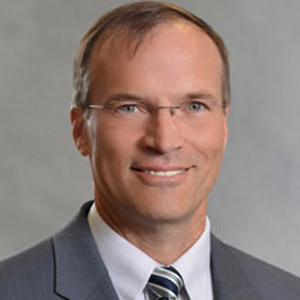
The academic chair of Drexel’s Department of Emergency Medicine, Richard Hamilton, didn’t necessarily set out to work in academic medicine — but the seed was first planted at Hahnemann University, he says.
“The experience of being around academic physicians became a template for what kind of physician I thought was most admirable.” After completing his medical degree, Hamilton served as a Navy flight surgeon, completed a residency in emergency medicine at the Jacobi Medical Center at Albert Einstein College of Medicine, and then finished his training with a medical toxicology fellowship at New York University/Bellevue.
“At that point, it was almost a calling for me to be in academics,” he says. “I’ve always worked in institutions that really focus both on delivering care to the underserved and on the experience of teaching new physicians and students.”
Hamilton returned to Philadelphia as the director of MCP’s Emergency Department in 1997, and assumed the role of emergency medicine service chief when MCP merged with Hahnemann. If he weathered some bumpy years and uncertainty that followed, it was with the conviction that his greater sense of purpose outweighed any institutional transitions.
“I could not have been more thrilled when Drexel took over the medical school. Because it gave a permanent home to me and my department at a larger university.” One thing Hamilton loves about academic medicine is that it allows him the flexibility to pursue different areas of interest. As such, he has been able to contribute to the field in multiple ways over the course of his career.
“I’ve always had the great joy of doing lots of different things and following my interests wherever they might lead me,” he says. “My first love was aerospace and aviation medicine, and I have continued that as a side interest all throughout my career, conducting research and development, supporting massive missions, being part of Virgin Galactic’s commercial space program. That has been very, very exciting work.”
As an emergency medicine clinician-educator and a scholar, Hamiton has taught hundreds of residents over the years and chaired the department at Drexel for 17 years. He also currently serves as president of the Pennsylvania College of Emergency Physicians. Finally, within his subspecialty, medical toxicology, he has produced much scholarship and writing, including publishing the pharmacopeia and textbooks on toxicology. He has won Drexel’s Distinguished Alumni Award for his research. Looking to the future, he sees a number of challenges ahead for his specialty area and for academic medicine in the round.
“I think emergency medicine is going to continue to evolve because the health care needs of the community are intensifying — especially for behavioral health care and mental health care — and becoming almost overwhelming to the resources that are out there. And we still struggle to deliver health care to everyone. There’s no question that the greatest challenges that lie ahead are financial struggles. As the budgets for Medicare and Medicaid continue to get constrained, hospitals, especially academic hospitals, find themselves constantly battling a very thin margin to stay afloat. With regard to medical education, the greatest challenge we have now is attracting a diverse group of bright minds to work in the field, because it’s hard work and there are much easier ways to make a living.”
Nevertheless, Hamilton has no regrets about his life choices, and he encourages young doctors to think about the bigger picture — the immense personal rewards reaped from a career in academic medicine.
“You do this work because you love it. It has given a tremendous sense of purpose to my day-to-day existence and everything I have worked to accomplish.”